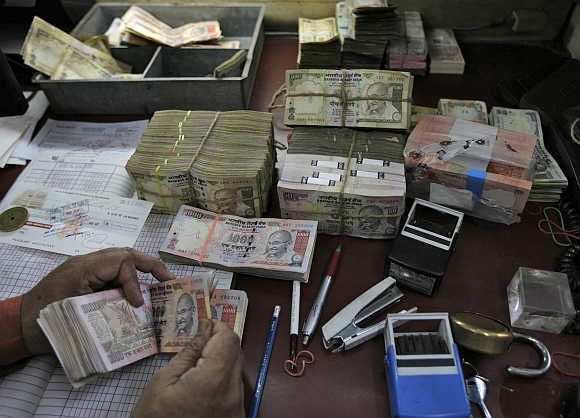 A further weakening in balance sheets of banks and companies might pose a risk to the nascent economic recovery, the International Monetary Fund’s (IMF) staff report on India has said.
A further weakening in balance sheets of banks and companies might pose a risk to the nascent economic recovery, the International Monetary Fund’s (IMF) staff report on India has said.
In the past few years, there has been a sharp deterioration in the asset quality of banks, especially the public-sector ones, which account for three quarters of assets in India’s banking system.
Part of this deterioration, the report points out, is because of the banking system’s high exposure to infrastructure projects, many of which continue to face regulatory and legal hurdles.
The report estimates public-sector banks’ (PSBs’) non-performing assets (NPAs) in 2013-14 at 4.7 per cent of total advances.
This is higher than the NPAs of the entire banking system which rose to 4.1 per cent in the year.
Further, at 7.2 per cent as of March 2014, PSBs’ restructured loans are estimated to be significantly higher than the entire banking system’s 5.9 per cent. This has resulted in a sharp slowdown in credit outflow to industry.
Further, a deterioration in corporate balance sheets has limited the space with industry for fresh investments.
The report points out that corporate vulnerability indicators remain elevated, with the share of loss-making companies and those with leverage ratios over two increasing to 22.9 per cent and 31.4 per cent, respectively, over the previous year.
So, to kick-start the investment cycle, the Fund sees improving banks’ asset quality and maintaining financial stability as key. The report recommends strengthening regulation for banks’ credit quality classification; increasing provisioning, particularly for all types of restructured assets; and bolstering capital buffers at PSBs which is critical to ensuring banks are able to support the economic recovery.
But here lies the problem. According to the Fund’s analysis, if the government were to provide the full amount of capital required by banks, it would cost between 1.2 per cent and 1.7 per cent of the country’s estimated gross domestic product in 2018-19.
Given its limited fiscal space, however, the government is unlikely to be able to provide the required capital. While many had earlier hoped the Budget for 2015-16 would provide some clarity on this issue, there was no announcement on lowering of government stake in PSBs and allowing these banks to directly raise capital from the markets.
Among other measures the report proposes for improving banks’ debt-recovery mechanism by providing incentives for swiftly dealing with delinquent borrowers and promoters, measures to enhance the corporate bond market in India, and reworking the financial regulatory architecture on the basis of the recommendations of the Financial Sector Legislative Reform Commission (FSLRC).
The Budget has announced some measures in line with these recommendations. It has proposed a new bankruptcy law likely to help in debt recovery, and a public debt management agency likely to help create a more vibrant bond market, besides giving indications on introduction of the Indian Financial Code.







 © 2025
© 2025